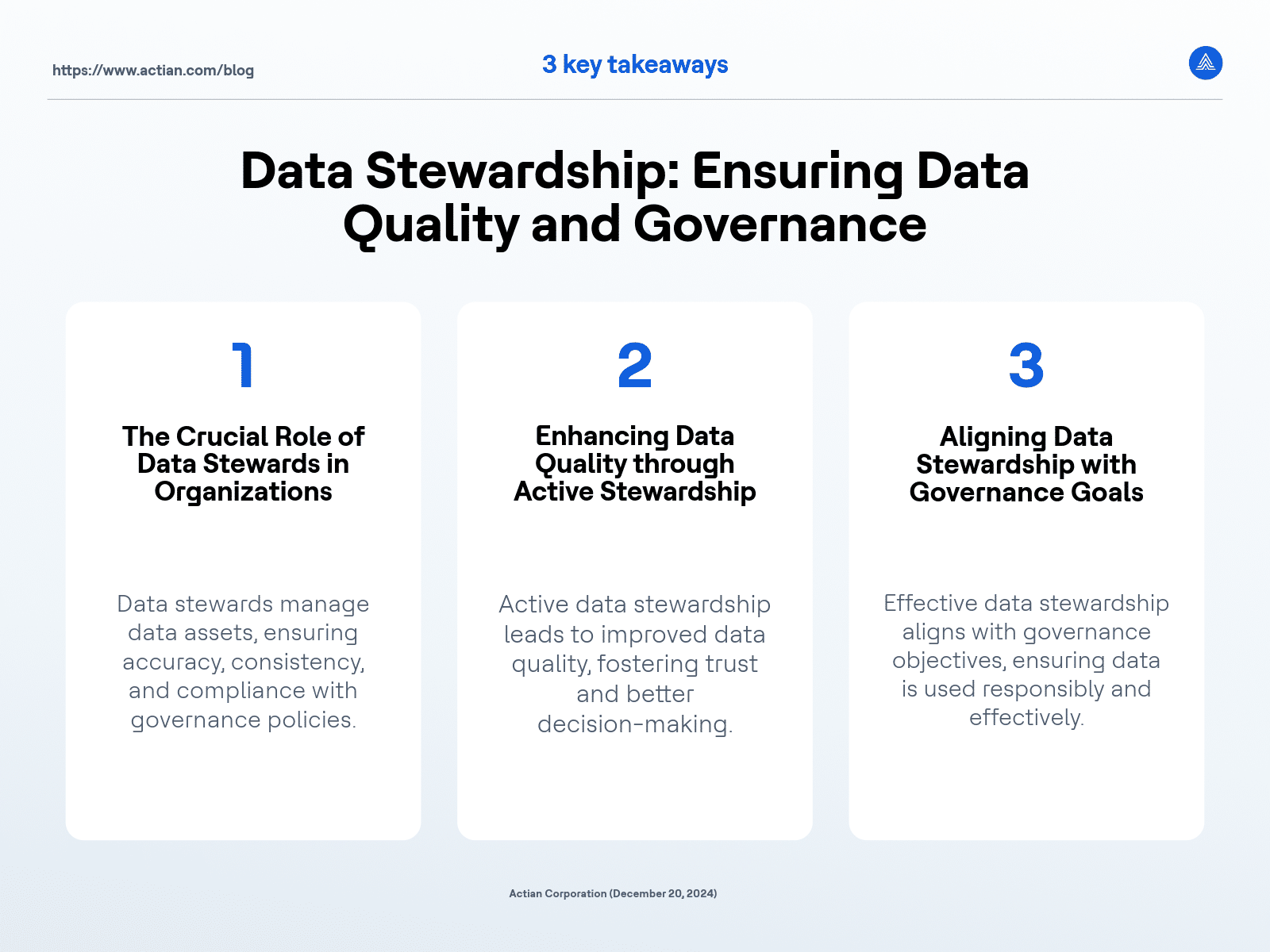What is Data Stewardship?
Actian Corporation
December 20, 2024

Data stewardship is a critical business function that oversees and manages an organization’s data assets. It ensures that high-quality data is available to consumers while adhering to data governance policies. In today’s data-driven business landscape, effective data stewardship is essential for organizations that rely on high-quality and efficient data to make informed decisions, drive innovation, and maintain a competitive edge.
For any organization to implement a successful data program, its members must be aware of their responsibilities. Data stewardship helps ensure stakeholders are given clear responsibilities aligning with overall goals and data governance. This article will explore the concept of data stewardship, its importance in modern businesses, and how it benefits both data consumers and producers. It will also delve into the role of data stewards, best practices for implementing successful data stewardship programs, and background information to help harmoniously integrate data stewardship plans into data governance programs.
The Role of a Data Steward
To better answer “What is data stewardship?” it helps to understand what a data steward does. Data stewards play a crucial role in ensuring the quality, security, and accessibility of an organization’s data assets. Their responsibilities span various aspects of data management, impacting multiple departments and stakeholders within the business.
On a daily basis, data stewards:
- Monitor Data Quality: They continuously assess and maintain data quality standards, ensuring that data is accurate, consistent, and reliable across all systems and processes.
- Implement and Enforce Data Governance Policies: Data stewards work closely with the data governance team to implement and enforce data usage, security, and compliance policies.
- Collaborate With Stakeholders: They act as liaisons between different departments, such as IT, business units, and compliance teams, to address data-related issues and requirements.
- Manage Metadata: Data stewards oversee the creation and maintenance of metadata, which helps users understand the context, origin, and quality of data assets.
- Resolve Data Issues: They investigate and resolve data quality issues, discrepancies, and conflicts that arise within the organization.
- Provide Data-Related Training and Support: Data stewards educate users across the organization on data best practices, tools, and processes.
- Participate in Data-Related Projects: They contribute to data integration, migration, and analytics initiatives to ensure data quality and consistency throughout these processes.
Data stewards commonly work with several departments and stakeholders across the organization. They collaborate closely with IT departments on data infrastructure, security, and integration projects. Compliance and legal teams work hand-in-hand with data stewards to ensure data management practices meet compliance standards. Data analytics teams benefit from the support of data stewards in data preparation and quality assurance for their analytical initiatives. At the executive level, data stewards provide valuable insights on data asset management and its impact on business objectives, helping to shape overall data strategy.
In a larger organizational sense, data stewards advocate for end users, ensuring that data producers and IT organizations meet the needs of those who rely on high-quality, accessible data. They play a crucial role in supporting regulatory compliance, and by maintaining high-quality data, they enable executives and managers to make informed decisions based on reliable information. Perhaps most importantly, data stewards help organizations recognize and leverage the value of their data assets, promoting data as a strategic asset that can drive business growth and innovation.
What is Data Stewardship’s Relation to Data Governance?
Data stewardship and data governance work together to ensure the effective management of an organization’s data. While data governance provides the overall framework, policies, and standards for data management, data stewardship focuses on the day-to-day implementation and execution of these policies.
In terms of organizational structure, data stewardship often operates within the broader data governance framework:
- Data Governance Managers: Sets overall strategy and policies.
- Data Stewardship Managers: Coordinates data stewardship activities across the organization.
- Domain Data Stewards: Manage data within specific business domains or functional areas.
This hierarchical structure ensures that data stewardship activities align with the organization’s overall data governance goals while allowing for specialized management of data assets within different areas of the business.
Best Practices for Data Stewardship Programs
Now that you’re familiar with its larger place in an organization, you need to know what data stewardship practices can make your program as successful as possible. Managers of successful data stewardship programs employ several best practices to maximize efficiency and achieve business goals:
- Establish Clear Roles and Responsibilities: Define the roles of data stewards, data owners, and other stakeholders involved in data management.
- Develop Data Quality Standards: Create and maintain detailed standards for data accuracy, completeness, consistency, and timeliness.
- Implement Data Governance Frameworks: Align data stewardship activities with broader data governance initiatives to ensure consistency and effectiveness.
- Leverage Automation and Tools: Utilize data quality tools, metadata management systems, and data catalogs to streamline data stewardship processes.
- Foster Cross-Functional Collaboration: Encourage communication and cooperation between different departments to address data-related challenges.
- Provide Ongoing Training and Education: Offer regular training sessions to keep data stewards and other stakeholders updated on best practices and emerging trends.
- Establish Key Performance Indicators (KPIs): Define and track metrics defined by executives to measure the success of data stewardship initiatives and identify areas for improvement.
- Conduct Regular Audits and Assessments: Perform periodic reviews of data assets, processes, and policies to ensure continued alignment with business objectives and data compliance.
- Implement a Data Catalog: Maintain a centralized metadata repository to help users utilize data assets to their fullest capabilities.
Benefits of Data Stewardship for Data Consumers
Effective data stewardship provides numerous benefits to data consumers within an organization. By ensuring high-quality, accessible, and reliable data, data stewards enable users to make informed decisions and drive business value.
Key benefits for data consumers include:
- Improved data quality and reliability.
- Enhanced data discoverability and accessibility.
- Greater trust in data-driven insights and decisions.
- Reduced time spent on data preparation and cleansing.
- Increased compliance with data usage policies and regulations.
- Streamlined data request and access processes.
- Reduced risk of using outdated or inaccurate data.
- Improved collaboration and data sharing between departments.
Benefits of Data Stewardship for Data Producers
Data stewardship not only benefits consumers but also provides significant advantages to data producers. By implementing best practices and standards, data stewards help producers optimize their data management processes and increase the value of their data assets.
Benefits for data producers include:
- Streamlined data production processes.
- Reduced data redundancy and duplication.
- Improved data integration capabilities.
- Increased efficiency in data management workflows.
- Better alignment between data production and business needs.
- Improved data lifecycle management.
- Greater visibility into data usage and value.
Use Cases for Data Stewardship
Data stewardship plays a crucial role across many industries, helping organizations manage their data assets effectively and derive maximum value from their information. Here are some industry-specific use cases that highlight the importance of quality data stewardship programs:
Healthcare
In the healthcare industry, data stewardship is essential for managing patient information, ensuring regulatory compliance, and supporting medical research:
- Electronic Health Records (EHR) Management: Ensuring the accuracy and completeness of patient records, facilitating better care coordination and reducing medical errors.
- HIPAA Compliance: Helping maintain patient data privacy and security in accordance with HIPAA regulations.
- Clinical Research: Supporting the integration and quality control of data used in medical research and clinical trials.
Financial Services
The financial sector relies heavily on accurate and timely data for risk management, regulatory reporting, and customer service:
- Regulatory Reporting: Ensuring the accuracy and consistency of data used for regulatory reports.
- Customer Data Management: Maintaining the quality and integrity of customer information across various systems, supporting Know Your Customer (KYC) initiatives and personalized services.
- Fraud Detection: Ensuring the quality and integration of data used in fraud detection algorithms.
Telecommunications
In the rapidly evolving telecommunications industry, data stewardship is vital for managing customer data, network information, and service quality:
- Customer Experience Management: Improving the accuracy and consistency of customer data, enabling personalized services and effective customer support.
- Network Performance Monitoring: Managing the quality and reliability of data used to monitor network performance and plan infrastructure improvements.
- Regulatory Compliance: Supporting compliance with telecommunications regulations by ensuring data accuracy in regulatory reporting.
Manufacturing
In manufacturing, data stewardship is crucial for optimizing production processes, managing supply chains, and ensuring product quality:
- Supply Chain Optimization: Maintaining accurate and up-to-date information on suppliers, inventory, and logistics, enabling better supply chain management.
- Quality Control: Stabilizing the integrity and consistency of data used in quality control processes, supporting continuous improvement initiatives.
- Predictive Maintenance: Managing the data used for predictive maintenance models, helping to reduce downtime and maintenance costs.
Actian Supports Data Stewardship Best Practices
Actian provides a comprehensive suite of data management solutions that support and enhance data stewardship practices across organizations. The Actian Data Platform offers a robust foundation for implementing effective data stewardship programs through its various features and capabilities. Its data integration tools, including DataConnect, help organizations maintain high-quality data by providing robust Extract, Transform, Load (ETL) capabilities and quality checks. And businesses can utilize the Zeenea Data Intelligence Platform to standardize data storage and usage according to data governance policies, which increases data democratization while making data stewardship simpler and easier to understand for stakeholders.
Actian’s solutions integrate seamlessly with data governance frameworks, helping organizations align their data stewardship practices with broader governance initiatives. As organizations grow and evolve, the Actian Data Platform is designed to scale with increasing data volumes and user communities, providing ongoing support for data stewardship efforts. More help creating large-scale data stewardship initiatives can be found in the blog “The Importance of Data Stewardship Agreements Across Companies.”
Key Takeaways

Subscribe to the Actian Blog
Subscribe to Actian’s blog to get data insights delivered right to you.
- Stay in the know – Get the latest in data analytics pushed directly to your inbox.
- Never miss a post – You’ll receive automatic email updates to let you know when new posts are live.
- It’s all up to you – Change your delivery preferences to suit your needs.